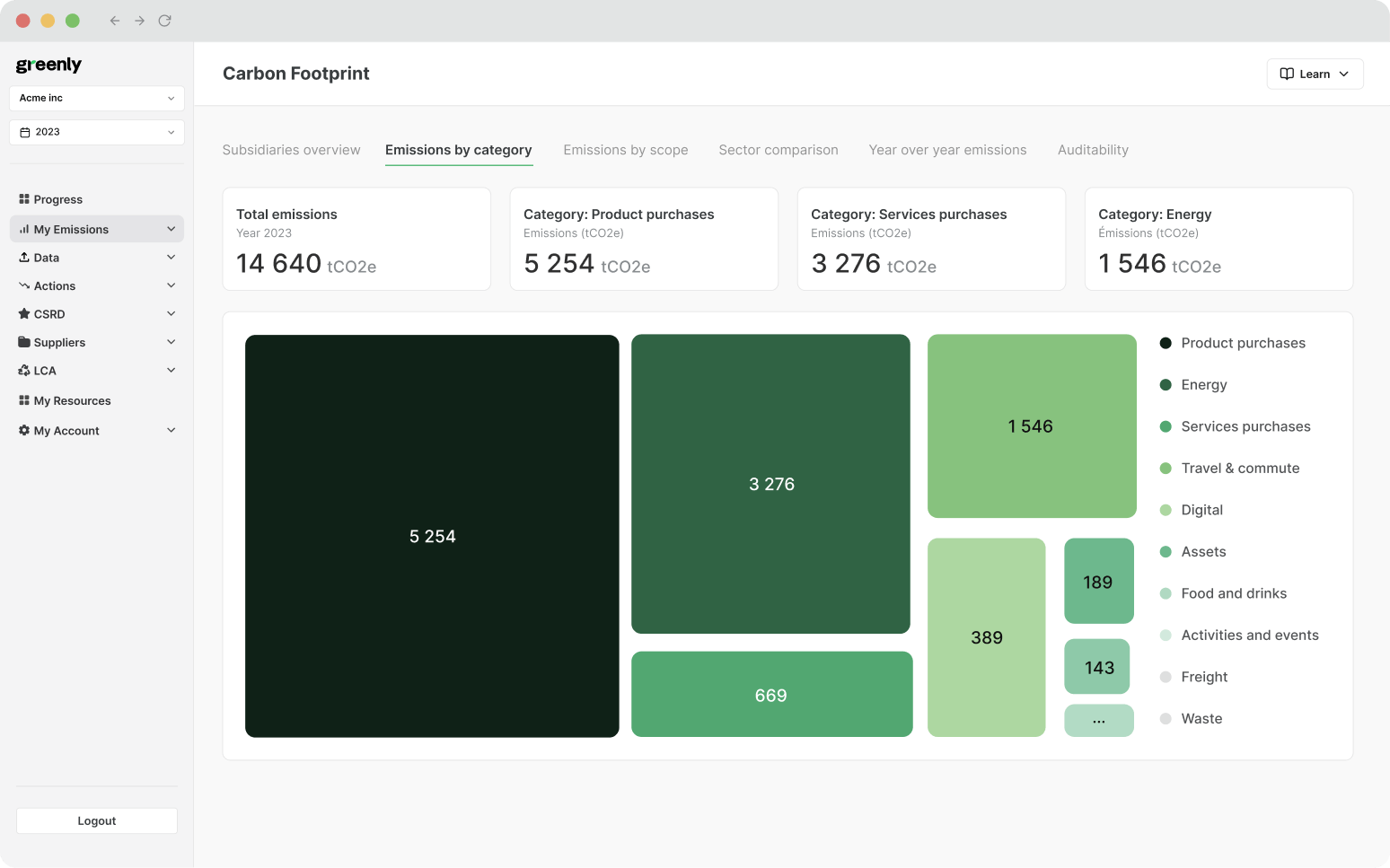
Impacts, Risks, and Opportunities (IRO) for CSRD Reporting
In this article, we’ll break down what IROs are, how to identify and assess them, and what CSRD requires in terms of disclosure.
ESG / CSR
Industries



In this article, we’ll break down what CSR really means, why it matters, and how companies of any size can benefit from a thoughtful CSR strategy. You’ll find real examples, practical tips, and guidance on how to integrate CSR initiatives into your business in a way that’s impactful.
At its core, CSR is about doing business responsibly, whether that means reducing emissions, supporting fair labour practices, partnering with local communities, or making supply chains more sustainable.
These efforts are often tracked and shared in a company’s annual CSR report, which outlines the progress made and reinforces a commitment to transparency and accountability.
People often use different terms when talking about the same ideas behind CSR. Here’s a quick look at what each one means:
While Corporate Social Responsibility and the related terms we just covered tend to focus on a company’s values and voluntary efforts, ESG takes a more structured and measurable approach, often used by investors to assess long-term sustainability and risk.
CSR is about how a company chooses to take responsibility for its impact on society and the environment. It often involves voluntary actions, like donating to charities, supporting local communities, or launching sustainability programmes, that reflect the company’s values and commitment to doing good beyond just making a profit.
ESG (Environmental, Social, and Governance), on the other hand, is more data-driven. It’s a set of criteria investors, and other stakeholders, use to evaluate how well a company is managing risks and long-term sustainability. Rather than focusing on intentions, ESG looks at measurable performance – from carbon emissions and labour practices to board diversity and executive pay.
In short:
Both matter, but they serve different purposes and audiences.
So, if Corporate Social Responsibility is about how companies take responsibility for their social and environmental impact, what does that look like on a global scale?
This is where sustainable development comes in. CSR initiatives and sustainable development go hand in hand. In fact, one of the most recognised global standards for Corporate Social Responsibility - ISO 26000 - defines it as a company’s responsibility to behave ethically and transparently in ways that support sustainable development.
A key tool for putting this into action is the UN Sustainable Development Goals (SDGs) - a set of 17 goals designed to tackle global challenges like poverty, inequality, climate change, and access to education and clean water. These goals provide a clear, shared framework businesses can use to shape their CSR strategies and maximise their positive impact.
By aligning with the SDGs, companies can ensure their CSR efforts are not only meaningful but also part of a broader global movement toward a more sustainable future.
From that point on, CSR began to take shape as more than just charitable donations. By the early 2000s, companies started formalising their efforts through reporting standards, most notably with the launch of the Global Reporting Initiative (GRI) in 2000. GRI quickly became one of the most widely used frameworks for CSR reporting.
And adoption skyrocketed: between 2000 and 2010, the number of the world’s 250 largest companies publishing CSR reports jumped from just 1% to over 90 %.
Today, businesses can choose from a variety of standards to guide their CSR efforts. Alongside GRI, you’ll find frameworks like:
We’ll dive deeper into some of these later on.
While CSR reporting started with large multinationals, smaller businesses are increasingly getting involved too. Many are choosing to demonstrate their commitment through certifications like B Corp, which measure social and environmental impact alongside profit.
Corporate Sustainability Reporting hasn’t been without its critics. Some argue that relying on voluntary efforts gives companies too much freedom, potentially delaying stronger environmental or social regulations.
But in many ways, CSR reporting has laid the groundwork for today’s policies. Governments are now stepping in to formalise reporting practices through regulations like the EU’s Sustainable Finance Disclosure Regulation (SFDR), which includes requirements around climate and human rights disclosures.

CSR initiatives can take many different forms, and most businesses combine several approaches depending on their goals, values, and resources. Here are four key types of CSR in action:
Environmental Responsibility
Reducing your company’s impact on the planet.
Ethical Responsibility
Doing the right thing, for employees, suppliers, customers, and society.
Philanthropic Responsibility
Donating to charities, supporting local projects, encouraging employees to volunteer, etc.
Financial Responsibility
Putting money behind initiatives that support sustainability, diversity, equity, inclusion, and social well-being.
This is about reducing your company’s impact on the planet - and ideally, making a positive difference.
That could mean cutting emissions, recycling more, switching to sustainable materials, or creating greener products. Many companies also focus on improving energy efficiency, reducing waste, or managing their supply chains more responsibly to minimise environmental harm.
Ethical responsibility is about doing the right thing, for employees, suppliers, customers, and society.
It includes things like fair labour practices, equal opportunity hiring, inclusive workplace policies, and transparency with stakeholders. Companies that prioritise ethical responsibility aim to build trust through honesty, integrity, and fairness in how they operate.
Philanthropic responsibility focuses on giving back.
It might involve donating to charities, supporting local projects, encouraging employees to volunteer, or partnering with organisations that share the company’s values. Some businesses go further by aligning their supply chain with partners that also prioritise social good, helping to extend their impact beyond their own operations.
CSR isn’t just about good intentions – it also takes investment.
Financial responsibility means putting money behind initiatives that support sustainability, diversity, equity, inclusion, and social well-being. That could mean funding community programmes, investing in R&D for eco-friendly products, or building long-term strategies that make responsible business part of the bottom line.
Here’s how responsible business practices pay off:
Corporate Social Responsibility helps boost a company’s reputation and perceived value beyond just financial performance. By actively promoting sustainability and social initiatives, businesses can position themselves as leaders in their industry, attracting customers, partners, and stakeholders who care about ethical practices.
Investors are increasingly looking at CSR performance when assessing long-term risk and value. According to CECP’s 2021 Giving in Numbers report, around 80% of businesses now share CSR data with investors, highlighting how closely Corporate Social Responsibility is tied to financial decision-making and sustainable growth.
Today’s customers want to support brands that showcase ethical behavior. A 2020 Kantar Purpose study found that brands with a positive social or environmental impact grew by 175% over 12 years, compared to just 70% for others. CSR helps businesses build stronger emotional connections with their audience by showing they care about more than just profit – whether that’s through sustainability efforts, community support, or ethical supply chains. When done well, this not only builds trust but sets brands apart in a crowded market.
Corporate Social responsibility plays a major role in attracting and keeping top talent. According to a 2021 Deloitte survey, 44% of millennials and 49% of Gen Z consider a company’s ethics when choosing where to work. Businesses with strong Corporate Social Responsibility programs see 40% higher employee retention than their competitors – a big deal, especially considering that losing a single employee can cost more than 40% of their annual salary, according to the Washington Center for Equitable Growth.
Sustainable practices like energy conservation, waste reduction, and smart resource use don’t just help the planet, they reduce costs too. Companies that invest in cleaner technologies or streamline supply chains often find they’re more efficient, more profitable, and less exposed to environmental risks.
Corporate Social Responsibility encourages companies to think creatively about how to solve real-world problems. That often leads to the development of new products, services, or business models, and opens up opportunities in emerging markets. By addressing social and environmental challenges, businesses can discover entirely new ways to grow and succeed.

There’s no one-size-fits-all approach to Corporate Social Responsibility, but there are a number of key global frameworks that can help businesses build credible, consistent, and transparent strategies. These frameworks guide companies on how to measure, report, and improve their social and environmental impact in line with international standards.
The right one depends on your company’s size, sector, goals, and stakeholder expectations.
| Framework 📗 | What it does 🧐 | Focus areas 📍 | Best for 👍 |
|---|---|---|---|
| Global Reporting Initiative (GRI) | Provides detailed sustainability reporting standards used worldwide, helping companies measure and communicate their social and environmental impact. | Economic, environmental, and social impacts including labour practices, human rights, and community involvement. | Large or mid-sized companies looking for comprehensive, globally recognised sustainability reporting. |
| UN Global Compact (UNGC) | Encourages businesses to align with 10 universal principles and report progress. Participation is voluntary but influential. | Human rights, labour, environment, anti-corruption. | Companies of all sizes seeking to publicly commit to responsible business principles and align with the UN’s SDGs. |
| Sustainable Accounting Standards Board (SASB) | Provides industry-specific sustainability disclosure standards to help companies share financially material information with investors. | ESG issues tailored to specific sectors. | Publicly listed companies, especially those with investor-facing reports. |
| Integrated Reporting (IR) Framework | Combines financial and non-financial data in one report to show how a business creates long-term value. | Strategy, governance, sustainability, performance. | Companies with mature reporting practices looking to integrate sustainability into financial strategy. |
| ISO 26000 | Offers guidance on how to operate in a socially responsible way, without certification. | Governance, human rights, labour, environment, fair practices, consumer issues, community engagement. | Companies seeking broad internal guidance on responsible behaviour – especially useful for first-time CSR efforts. |
| CDP (Carbon Disclosure Project) | Helps companies measure and disclose environmental impact to investors and stakeholders. | Climate change, water security, deforestation, supply chain emissions. | Mid-sized to large companies, particularly those in carbon-intensive industries or with investor pressure. |
| B Corp Certification | Certifies businesses that meet high standards in social and environmental performance, with legal accountability. | Governance, workers, community, environment, customers. | Purpose-driven companies (including SMEs) that want formal recognition and branding for their impact. |
| SA8000 (Social Accountability International) | Provides a certification for decent working conditions based on ILO and human rights conventions. | Worker rights, health and safety, fair pay, discrimination, working hours. | Companies with global supply chains, especially in manufacturing or industries where labour rights are a key concern. |

A well-designed Corporate Social Responsibility policy should reflect your company’s values and long-term vision. It’s not a one-off project, but an ongoing commitment to improving your social, environmental, and economic impact. Whether you’re starting from scratch or refining existing efforts, here’s a practical roadmap to help guide your approach:
To help you stay on the right track, here are some of the most common CSR mistakes – and what to do instead:
| Mistake 🚫 | Why it matters ⁉️ | What to do instead ♻️ |
|---|---|---|
| Lack of genuine commitment | Treating CSR as a branding exercise rather than a core business value can damage trust. Stakeholders can quickly spot performative efforts. | Make CSR part of your company’s identity – not just your messaging. Integrate it into your strategy, culture, and daily operations. |
| Ignoring stakeholder input | CSR policies that don’t reflect the needs or concerns of employees, customers, or communities often fall flat. | Involve stakeholders early and often. Their insights help create more relevant and effective initiatives. |
| Setting unrealistic goals | Overly ambitious targets can set your company up for failure and harm credibility. | Focus on achievable, measurable goals. You can scale efforts over time as your CSR programme matures. |
| Poor communication | If stakeholders aren’t aware of your CSR work, it’s difficult to build support or showcase progress. | Communicate regularly and transparently through reports, newsletters, and social media. Share both wins and lessons learned. |
| Not measuring impact | Without tracking your progress, you won’t know what’s working – or where to improve. | Use clear metrics to evaluate your initiatives. Make data part of the learning and growth process. |
| Focusing only on short-term wins | Short-term thinking can undermine long-term impact and lead to inconsistent efforts. | Prioritise sustainable change. Consider how your actions today will shape outcomes tomorrow. |
| Inconsistent implementation | A CSR policy that isn’t applied evenly across departments or locations can confuse employees and weaken results. | Ensure all teams are aligned and engaged. CSR should be reflected across your operations. |
| Overlooking employee engagement | Without employee buy-in, CSR efforts often struggle to take root. | Empower employees to contribute. Encourage participation, provide opportunities for involvement, and celebrate internal champions. |

Here are a few standout examples:
Waiting for regulatory changes or reputational damage to drive change means missing out on opportunities to lead in your industry.
Greenly helps you proactively engage in Corporate Social Responsibility, positioning your company as a leader in social responsibility and environmental stewardship.
Greenly offers a range of services to help you effectively manage your carbon footprint:
Greenly helps you engage suppliers and transition to low-carbon options, achieving greater transparency and effectively managing Scope 3 emissions. Our sustainable sourcing initiatives build greener partnerships and reduce emissions throughout your supply chain.
Our user-friendly platform simplifies the process of calculating and monitoring your carbon footprint. With Greenly, your business can effortlessly manage its environmental impact, meet ESG goals, and enhance sustainability.
Acting now on CSR prepares you for future regulations and positions your company as a proactive leader in sustainability. Greenly can help you seize these opportunities, transforming your business strategy from reactive to proactive and setting you apart from the competition.
Greenly offers comprehensive support for your CSR journey, from carbon measurement and custom action plans to supply chain decarbonisation and seamless platform integration. With our help, your business can significantly reduce its environmental impact and implement socially responsible business practices.
Contact Greenly today to start leading the way in CSR and build a greener future for your company.
